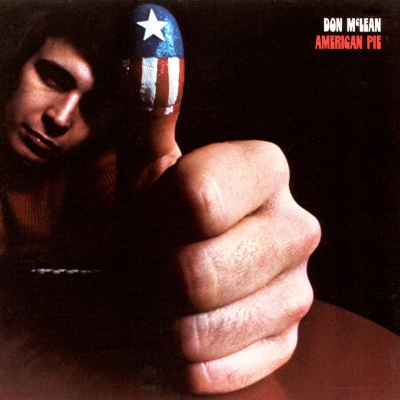
American Pie
1971年,一直默默无闻的美国民谣歌手Don McLean(唐·麦克林)在灵感泉涌中写下了一首超长的歌曲《American Pie》(美国派),不仅使他一夜成名,而且把他和他的这首作品一直流传到了21世纪的今天。 《American Pie》堪称一首史诗式的作品,纵观全球乐坛,能将一首长达8分34秒的歌曲唱得不仅不让人生厌,还让人们津津乐道并传颂几十年的现象可谓少之又少,而唐 ·麦克林和他的《American Pie》就做到了,如果作品里没有引人入胜的叙事性、没有内蕴幽远的深刻性,很难相信人们真会傻呆呆地将这么长的时间消耗在一首歌曲里。 《American Pie》是用音乐记录美国六十年代历史的一首史诗,没有春风得意的赞美,也没有针锋相对的批判,有的只是在轻快的民谣节奏中娓娓地道来——那里面有整整一个时代美国人所见、所思、所想,以及所经历的往事,而事实上正是这样不带主观评述的质朴歌声,最终打动了一代又一代的美国人,甚至是美国以外的人。 唐· 麦克林另一首脍炙人口的作品非属《Vincent》(文森特)不可,与《American Pie》相比,《Vincent》更像是一首借物抒情的个人小品,歌曲取材于梵高的名画《The Starry Night》(星夜),当然在唐·麦克林那轻柔的歌声中你也许已经无法将它联想到圣雷米的德莫索尔精神病院,在几近透明的木吉它和不加修饰的歌声里,你所能想到的也许只有一片点缀着莹莹星光的夜空,而绝对不会回想起在那幅画作问世13个月之后的那一声枪响,而是否每当一种宁静纯粹到绝对的程度时,也往往意味着另一种惊天动地的燥动也将随之而来,就如同梵高的悲剧一样。 正是《American Pie》和《Vincent》两首作品给了唐·麦克林一生享用不尽的名利,你如果能找到一张他的精选专辑里居然没有收录以上两首作品中的任一首,那我就对你五体投地,事实上,唱片公司的发行人才不会干那大脑缺氧的傻事,所以每次听唐·麦克林的精选或回顾专辑,也正是让你多一次机会重温一下这两首名曲,就像2000年由Capitol发行的《American Pie-The Greatest Hits》的精选专辑,虽然也收录了由他翻唱的著名爱尔兰民谣《Mountains Of Mourne》以及Roy Orbison的名曲《Crying》,甚至还有他最敬仰的歌手Buddy Holly的作品《Everyday》,但与《American Pie》和《Vincent》相比,他们也只有退居其次、扮演一个默默无闻的小角色了。 这就是一个美国的民谣时代,这就是一个纽约的民谣歌手,这就是一张记录一个时代的专辑。 by William Ruhlmann Don McLean's second album, American Pie, which was his first to gain recognition after the negligible initial sales of 1970's Tapestry, is necessarily dominated by its title track, a lengthy, allegorical history of rock & roll, because it became an unlikely hit, topping the singles chart and putting the LP at number one as well. "American Pie" has remained as much a cultural touchstone as a song, sung by everyone from Garth Brooks to Madonna, its title borrowed for a pair of smutty teen comedies, while the record itself has earned a registered three-million plays on U.S. radio stations. There may not be much more to note about it, then, except perhaps that even without a crib sheet to identify who's who, the song can still be enjoyed for its engaging melody and singable chorus, which may have more to do with its success than anything else. Of course, the album also included "Vincent," McLean's paean to Van Gogh, which has been played two-million times. Nothing else on the album is as effective as the hits, but the other eight original songs range from sensitive fare like "Till Tomorrow" to the sarcastic, uptempo "Everybody Loves Me, Baby." American Pie -- the album -- is very much a record of its time; it is imbued with the vague depression of the early '70s that infected the population and found expression in the works of singer/songwriters. "American Pie" -- the song -- is really a criticism of what happened in popular music in the '60s, and "Vincent" sympathizes with Van Gogh's suicide as a sane comment on an insane world. "Crossroads" and "Empty Chairs" are personal reflections full of regret and despondency, with the love song "Winterwood" providing the only respite. In the album's second half, the songs get more portentous, tracing society's ills into war and spiritual troubles in "The Grave" and "Sister Fatima." The songs are made all the more poignant by the stately folk-pop arrangements and McLean's clear, direct tenor. It was that voice, equally effective on remakes of pop oldies, that was his salvation when he proved unable to match the songwriting standard set on Tapestry and this collection. But then, the album has an overall elegiac quality that makes it sound like a final statement. After all, if the music has died, what else is there to say?
